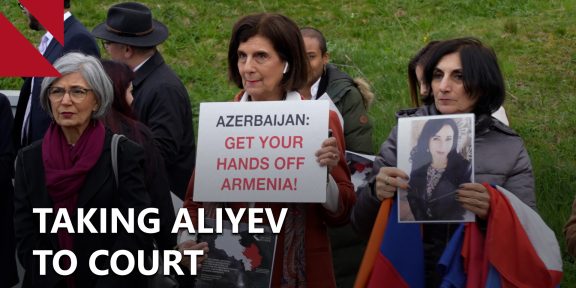In July 2014, accompanied by my CivilNet colleague Gevorg Haroyan, we hurried to the village of Nor Erkej in Karvachar/Kelbajar (New Shahumyan) region. Sixteen year old Smbat Tsakanyan was killed by an Azerbaijani intelligence-subversive group in those days. This was probably the most difficult coverage throughout my journalistic experience. Being present at the funeral of a teenager buried in a closed coffin, under the scorching summer sun, and interview the boy’s relatives, including his father, half an hour later.
From the standpoint of journalistic ethics, this was not acceptable. And when we returned to the CivilNet office, one of my colleagues criticized us for it. A few days later, we went to Tsovinar Village on the shore of Lake Sevan, where the Armenian army officer, 42-year-old Sargis Abrahamyan, had been buried. Abrahamyan, a father of three small children, was killed on the way to Karvachar in an attack by an Azeri subversive-intelligence group. We made a report titled “An Interrupted Story. Major Sargis Abrahamyan”. It was very hard to talk to the parents, the wife of the murdered, and especially the children.
One of the members of the subversive group that had infiltrated Karvachar was killed and the other two were arrested several days later. Shahbaz Guliyev and Dilham Askerov were found guilty of murder, kidnapping and espionage. The court of Artsakh sentenced Askerov to a life sentence and Guliyev to a 22 year imprisonment.
It was announced on various occasions that Azerbaijanis should bear their punishment, and the matter of these two criminals cannot be subject to negotiations.
I met with Azerbaijani journalists in Tbilisi, as well as with representatives of international organizations involved in the exchange of prisoners and hostages several times. They have repeatedly stated that Azerbaijani leader Ilham Aliyev is ready to do everything to “save the two Azeris from Armenian captivity.” As to why were these two Azerbaijanis so important, they found it hard to say. They said that the release of Guliev and Askerov was a matter of honor for Ilham. A German dealing with prisoners of war and hostages told me during a private conversation that Azerbaijan is even ready to sit at the negotiating table with representatives of Nagorno-Karabakh in a third country and publicly agree on the exchange of Armenians and Azerbaijanis in Azerbaijan and Nagorno-Karabakh.
When I asked him why doesn’t that happen, he openly stated that the Nagorno Karabakh authorities are not willing to return Guliyev and Askerov under any circumstances. In addition to these two, one more Azerbaijani is kept in Karabakh, while three Armenians are held in Azerbaijan, charged with sabotage and war crimes.
The Azerbaijani side recently announced that it is ready to exchange the prisoners under “all for all” principle. The Karabakh authorities have already stated that this principle is unacceptable. Karabakh President’s spokesperson said to Radio Free Europe: “We cannot view the Azerbaijanis who committed serious crimes and the ordinary Armenian citizens who just crossed the border under the same light. The terrorist and the murderer must bear the punishment and we will not swap them.”
Official Yerevan announces that it has not received an offer of exchange from Baku.
In fact, the important thing here isn’t receiving or not receiving the offer itself, but the complicated choice that the Armenian side or sides are facing.
On one side of the scale is dignity, on the other – lives of three Armenian captives.
As an ordinary citizen, I would prefer the lives of the three Armenian captives and their immediate return home. If Askerov is to stay in jail for life, and Guliyev – for 18 years, there is no guarantee that the three Armenian captives will return home.
I can still hear the voice of the father of the murdered 16-year-old boy, demanding that Karabakh authorities never return the criminals.
The choice we must make is an impossibly difficult one.
Tatul Hakobyan
Read the article in Armenian
















